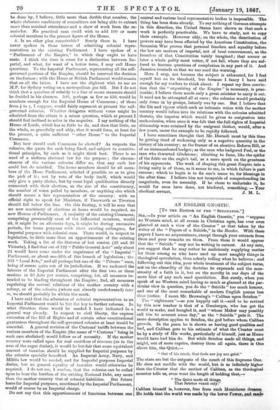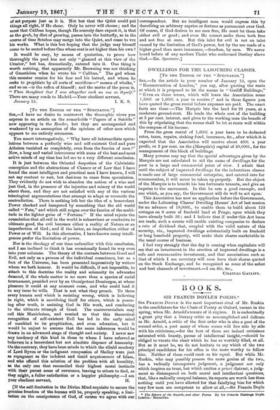AN ENGLISH GNOSTIC.
[To THE EDITOR OF THE " SPECTATOR.1 SIR, —In your article on "An English Gnostic," you "suppose no Western mind, at all events in Christian ages, has ever even glanced at such a view of the Creator" as that taken by the writer of the "Papers of a Suicide," in the Reader. With these papers I have no acquaintance, except through your extracts from them and your remarks on them. From these it would appear that the " Suicide " may not be writing in earnest. At any rate, you suggest that he may rather be maliciously supplying matter for those among us who have used up most naughty things in theological speculation, than soberly telling what he believes ; and following out this idea, your whole treatment of the subject turns, not on the absurdity of the doctrine he expounds and the mon- strosity of a faith in it, but on the novelty in our days of the mere hint of any such mad speculation. But surely, when you speak of no Western mind having so much as glanced at the par- ticular view in question, you do the " Suicide " too much honour, and one of the most remarkable of modern English poems leas than justice. I mean Mr. Browning's "Caliban upon Setebos."
The "nightmare "—as you happily call it.—said to be revived by this new teacher is that of a Demiurgos, who has got the world to make, and bungled it, and "whose Maker may possibly call him to account some day," as the " Suicide " puts it. The same description applies to Setebos, the god before whom Caliban grovels. In the poem he is shown as having good qualities and bad, and Caliban gets to his estimate of what the Creator must be by a study of His works, particularly of himself, just as Hume would have had him do. But while Setebos made all things, and might, out of mere caprice, destroy them all again, then is One above him, the Quiet,— " Oat of his reach, that feels nor joy nor grief."
The stars are but the outposts of the couch of this Supreme One. He does not meddle with the world, but is so infinitely higher than the Creator that the mother of Caliban, as the theological monster tells us, even went the length of holding that,—
" The Quiet made all things, That Setebos vexed only.'
Caliban himself is, however, free from such Manichean dreams, He holds that the world was made by the lower Power, §ncl rep*
of set purpose just as it is. Not but that the Quiet could put things all right, if He chose. Only he never will choose ; and the most that Caliban hopes, though He scarcely dare expect it, is that as the grub, by dint of growing, passes into the butterfly, so in the course of time Setebos may merge into the Quiet, and cease to vex his works. What is this but hoping that the judge may himself come to be seated before One whose seat is set higher than his own?
It would be easy, by means of quotation, to prove how thoroughly the poet has not only "glanced at this view of the Creator," but has, dramatically, entered into it. One thing is worth noticing, that apparently Mr. Browning was not thinking of Gnosticism when he wrote his " Caliban." The god whom this monster creates for his fear and his hatred, and whom he seeks to propitiate by all sorts of sacrifices—" messes of whelks," and so on—is the reflex of himself ; and the motto of the poem is, "Thou thoughtest that I was altogether such an one as thyself." There are many roads to Madrid.—Your obedient servant,































 Previous page
Previous page